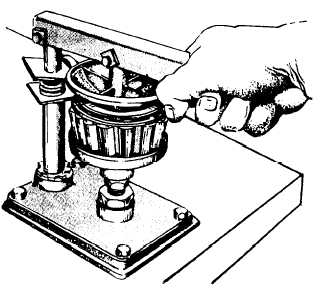Figure 11-7.—Fuse plugs.
physical damage, and melted fusible plugs. See
figure 11-7. Forward all wheels with cracks or loose
bearing cups to supply for overhaul. Partially melted
fuse plugs should not cause a wheel to be rejected.
The plug may not need to be replaced. If the eutectic
core material does not extend more than one-sixteenth
of an inch above the top surface of the hex head, the
plug may be kept in service “as is” with no
restrictions.
If the eutectic core material at the
threaded end is not depressed more than one-sixteenth
of an inch and there is no evidence of pinholes, the
plug may be kept in service with no restrictions. Do
not file, sand, or remove the eutectic material. If the
eutectic material appears to be filed, sanded, or
broken, you should assume the serviceable limits
have been exceeded and reject the plug.
You should perform the eddy current and dye
penetrant inspections for wheels listed in NAVAIR
04-10-1.
Inspect all tie bolts for corrosion,
elongation, bending, stripped threads, or deformed
shanks. You should also perform a magnetic particle
inspection for cracks according to NAVAIR
01-1A-16. Any of the listed defects is cause for
rejection of the tic bolt. Self-locking tie bolt nuts may
be reused provided the nut cannot be turned onto the
tie bolt by hand with the fingertight method
prescribed in Structural Hardware, NAVAIR
01-1A-8. On disc wheels, you should inspect brake
keys or gears for wear and looseness in accordance
Figure 11-8.—Pressure repacking of wheel bearings.
11-8














